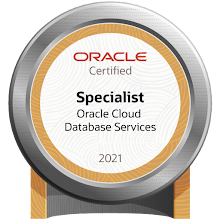It's little more difficult than in Unix.
We begin forming the name of the dumpfile:
Set fichero=MSMTD_%date:~-4,4%%date:~-7,2%%date:~4,2%%time:~0,2%%time:~3,2%
Example output: MSMTD_200803171559
Let's see the batch file:
export.bat
@echo off
set fecha=MSMTD_%date:~-4,4%%date:~-7,2%%date:~4,2%%time:~0,2%%time:~3,2%echo Se generaran los ficheros %fecha% {.dmp y .log}
expdp system/password directory=exports dumpfile=%fecha%.dmp logfile=%fecha%.log schemas=MSMTD content=all keep_master=N
@echo ****** FIN DE LA EXPORTACION *********
Monday, March 17, 2008
Thursday, March 6, 2008
Test the connections to all the instances
I find very useful to connect to all my instances at the beginning of the day; in that way I can anticipate a lot of e-mails. This one is the most simplest version, using a windows batch file.
We need to enter a shell on our desktop PC (surely with all the network permissions to access the instances we administer), an Oracle Client installed (to use sqlplus) and a tnsnames.ora configured (at least an Instance Client).
Example of use:
U:\>connects
BDEXTPPR
BDINTPPR
DWHDEV
DWHREP10
DWHPRO
...
U:\>
Here we can see the "connects.bat" file and the "exit.sql" file.
U:\>type d:\dba\connects.bat
@echo off
sqlplus -S "sys/password@bdintppr as sysdba" @c:\exit.sql
sqlplus -S "system/password@dwhpro" @c:\exit.sql
....
U:\>type c:\exit.sql
set pagesize 0
col instancia format a10
select UPPER(instance) INSTANCIA from v$thread;
exit
It's not the solution I most like, but it works well. The other solution I'm working in on consists in a PL/SQL the establish connections to the locations stored in a VARRAY.
We need to enter a shell on our desktop PC (surely with all the network permissions to access the instances we administer), an Oracle Client installed (to use sqlplus) and a tnsnames.ora configured (at least an Instance Client).
Example of use:
U:\>connects
BDEXTPPR
BDINTPPR
DWHDEV
DWHREP10
DWHPRO
...
U:\>
Here we can see the "connects.bat" file and the "exit.sql" file.
U:\>type d:\dba\connects.bat
@echo off
sqlplus -S "sys/password@bdintppr as sysdba" @c:\exit.sql
sqlplus -S "system/password@dwhpro" @c:\exit.sql
....
U:\>type c:\exit.sql
set pagesize 0
col instancia format a10
select UPPER(instance) INSTANCIA from v$thread;
exit
It's not the solution I most like, but it works well. The other solution I'm working in on consists in a PL/SQL the establish connections to the locations stored in a VARRAY.
Subscribe to:
Posts (Atom)

